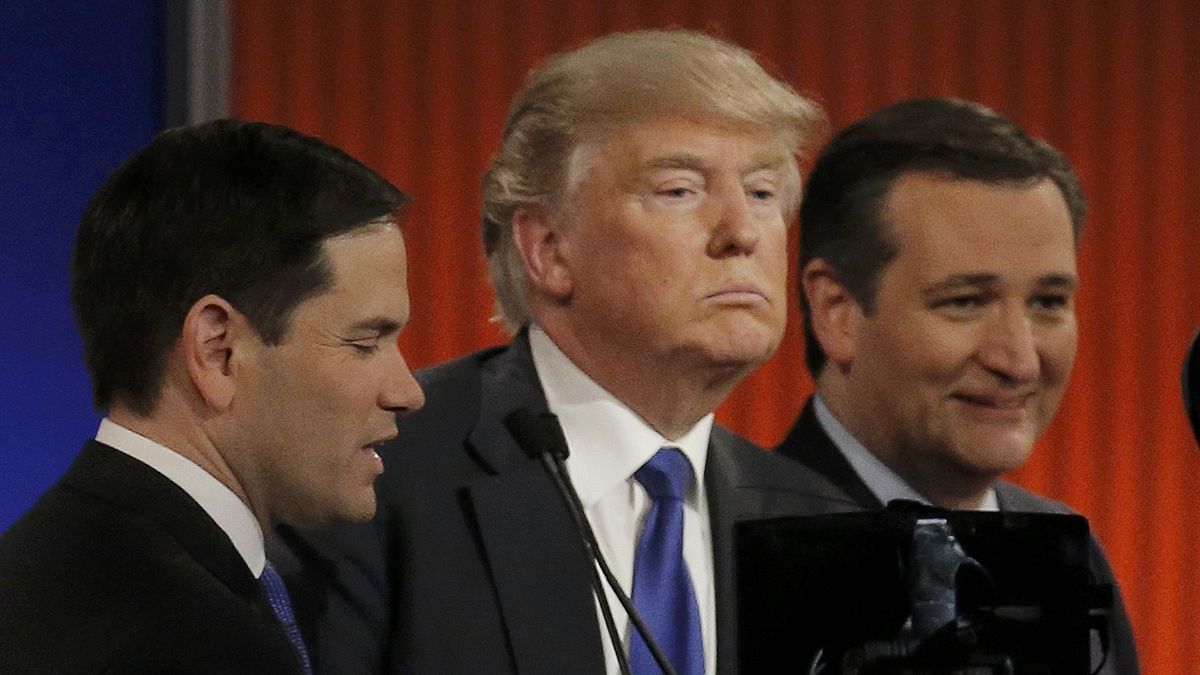The seemingly unstoppable victories of Donald Trump in this year’s Republican presidential campaign, already one of the most fascinating in recent
The seemingly unstoppable victories of Donald Trump in this year’s Republican presidential campaign, already one of the most fascinating in recent US history, has triggered an unprecedented reaction from the party establishment.
Last week, Mitt Romney, the 2012 Republican nominee, led a massive anti-Trump attack by depicting the real estate mogul as unelectable and a danger to the country.
Romney’s broadside failed. The blows aimed by party elders missed and Trump’s march to the nomination continued, as the latest primary results show.
Firstly, Trump suffered losses in Kansas and in Maine and his Kentucky and Louisiana victories were much narrower than expected. But this week, he scored big wins in Michigan, Mississippi and Hawaii and only lost the small western state of Idaho to Texas senator Ted Cruz.
Nonetheless, the “Stop Trump!” brigade have begun to pour money into television ads, with a particular focus on the big states voting on March 15. Four different groups have reserved at least $10m in airtime in Florida so far, the New York Times reports.
What is a brokered convention?
The establishment’s strategy – probably its last chance – is focusing on denying Trump the nomination at a so-called “brokered convention”, banking on the outlook that Trump might arrive in Cleveland in July with a plurality of delegates, but without the necessary majority.
A brokered convention is a situation in which no candidate has secured a majority of delegates before the first ballot. In this first ballot, the pledged delegates have to vote for their candidate. After that, most of the delegates are gradually “released” and free to vote for whomever they chose.
This is where the horse-trading begins. It used to be the way candidates were nominated prior to the era of presidential primaries.
It is also what the Republican establishment is hoping for: that the anti-Trump delegates, right now in a majority, but deeply divided, would coalesce around one single candidate that would ultimately beat The Donald.
Who could benefit from the horse-trading?
But here is where the problems start. The current second strongest candidate behind Trump is ultra-conservative Ted Cruz who terrifies the Washington party establishment even more than Trump.
Many Republican office holders believe that Cruz who was willing to shut down the US federal government over the controversial health care law and whose views on issues like abortion, gay marriage, climate change and voting rights put him far outside of today’s American mainstream, is as electable as Trump.
In a potential match-up of Cruz running against Democrat Hillary Clinton in a general election, so the conventional thinking goes, Cruz would be beaten brutally, taking down Republican candidates further down the ballot with him.
Trump: Cruz would have 'a shot' against Clinton, Rubio wouldn't https://t.co/7vjIXJPe8c | AP Photo pic.twitter.com/xmhbM6ehKB
— POLITICO (@politico) 2 de marzo de 2016
That prospect could create an opening for fellow conservative Florida senator Marco Rubio or John Kasich, the moderate governor of Ohio who comes closest to representing the dying Eisenhower-Rockefeller wing of the Republican Party, fiscally conservative and socially liberal.
The problem with Rubio and Kasich is that they have underperformed so far – and that is an understatement. Rubio has won only the politically irrelevant Minnesota and Puerto Rico whereas Kasich has not a single win on the board.
Both are under heavy pressure to drop out of the race, at least after the March 15 primaries when both their home states go to the polls. If Rubio beat Trump in Florida and Kasich did the same in Ohio, it would breathe fresh air into their flagging campaigns.
It would also give them the justification to stay in the race and to present themselves as viable alternative candidates at a brokered convention.
But if they lose – as latest polls indicate, they will be politically finished.
Could a “white knight” save the Republican Party? Mitt Romney?
That begs the following question: if Cruz is politically toxic and Rubio and Kasich are has-beens, who will challenge Trump at the convention? Enter Mitt Romney.
The 2012 nominee could be the “white knight” who Republican rank-and-file hope could save the party from further self-destruction. During his televised diatribe against Trump, Romney made it clear that he does not seek the nomination, but insiders believe he might change his mind if the “Draft Romney!” calls became too loud.
Romney heads the anti-Trump movement, but it may not be united enough to make an impact | https://t.co/xRwjQXhTmEpic.twitter.com/6iMH9xcTIZ
— RealClearPolitics (@RealClearNews) March 7, 2016
There are two problems with this scenario, writes political analyst James Zogby. In the first place, Romney, who lost badly against President Barack Obama, is not the ideal messenger for this anti-Trump crusade since he represents the face of the very same establishment that Trump and Cruz have been campaigning against.
The second problem is that this will largely be perceived as an “establishment fix.” Polls of Republican voters have shown that while 20 percent will not vote for Trump if he’s the party’s nominee, another 20 percent say they will not vote Republican if Trump is not the nominee.
And so, mid-way through this primary season, the Republican Party is in a “damned if they do, damned if they don’t situation”.
In addition, Trump might not sit idly by watching how the establishment manipulates the process and pushes him into oblivion. Chances are that he eventually seeks an independent run which would almost certainly hand the presidency to Hillary Clinton.
And then there is history: the last winning US presidential nominee produced by a brokered convention was Franklin D. Roosevelt in 1932 – and he was a Democrat.


